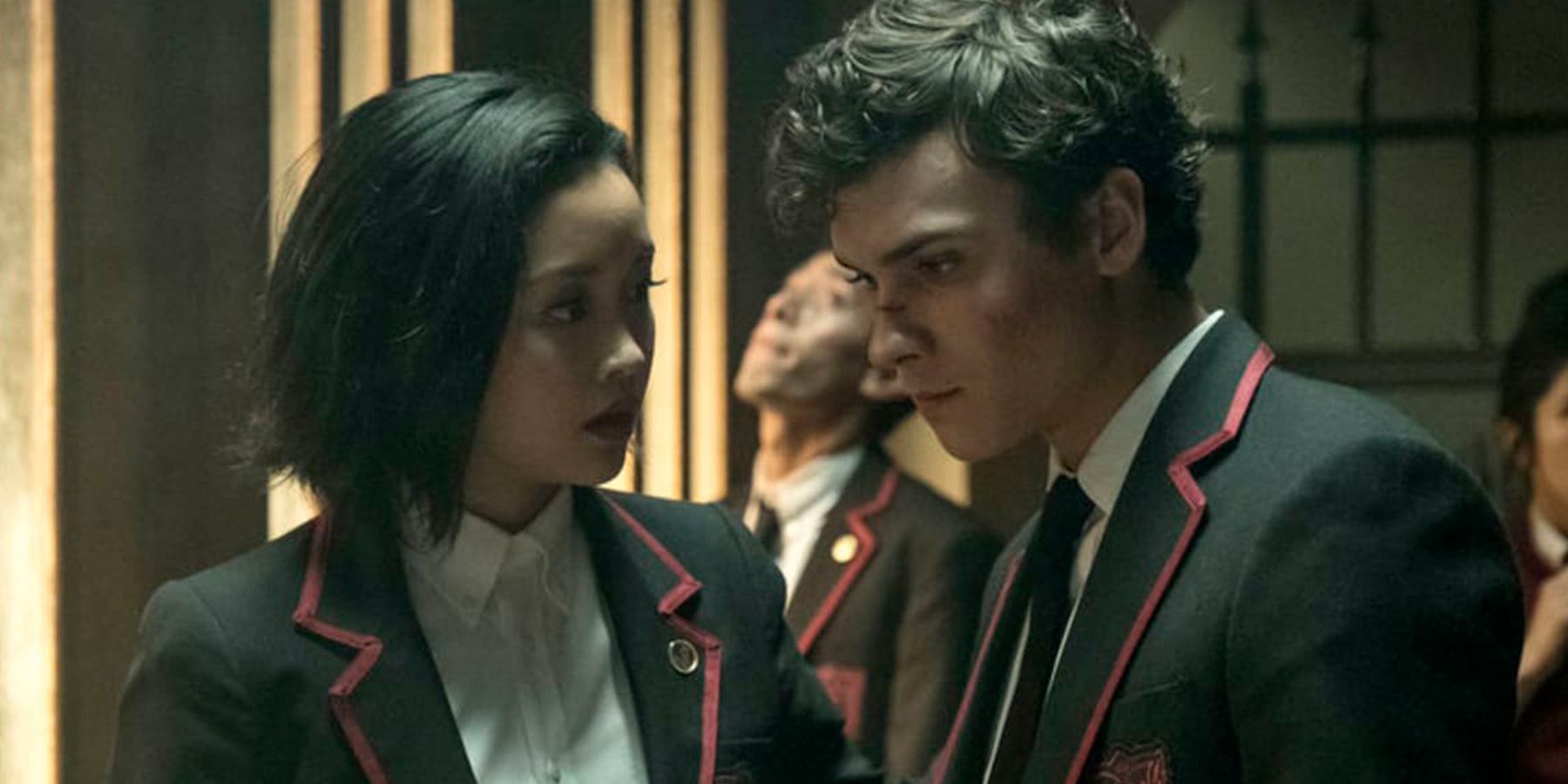The setting of Deadly Class (premiering January 16 on Syfy), a high school for assassins, is inherently nonsensical and ridiculous, although not necessarily any more so than Hogwarts School of Witchcraft and Wizardry or Xavier’s School for Gifted Youngsters. What makes Deadly Class (at least in its TV series incarnation) less convincing than Harry Potter or X-Men is that it keeps playing down the craziness, making it into something commonplace and boring. With its drab, dim visual style, glum performances and self-serious narration, Deadly Class seems determined to drain any fun from its goofy premise.
Based on the Image Comics series created by Rick Remender and Wes Craig, Deadly Class was developed for TV by Remender and Miles Orion Feldsott, and it sticks fairly close to the source material over its first four episodes, even lifting chunks of Remender’s narration and dialogue verbatim from the comics. At the same time, it loses something in translation, going from Craig’s stylized illustrations to the duller, more realistic look of live-action TV. Few of the actors exhibit as much personality as the characters do on the page, and Craig’s kinetic artistic style has been traded out for mediocre action scenes and muted, restrained production design.
RELATED REVIEW: The Passage Takes the Excitement Out of a Sci-Fi Epic
It doesn’t help that the characters are all based on stereotypes to begin with. In the heightened reality of the comics, it’s a bit more forgivable that all of the factions at the Kings Dominion school are divided along racial and ethnic lines, from the African-American gangbangers to the redneck white supremacists to the Latino drug cartels. But seeing real people in those roles makes the idea more distasteful, and the portrayal of the supposedly deep divisions among the different groups is inconsistent and narratively useless.
When biracial new kid Marcus Arguello (Benjamin Wadsworth) first shows up at Kings Dominion, he’s told he needs to pick a group to join, but then he’s able to befriend and team up with characters from various backgrounds without any repercussions (beyond the constant threat of violence that comes from being a Kings Dominion student in the first place). He’s also an immediate object of affection (and competition) for the show’s two female leads, and the portrayal of gender roles is just as broad and regressive as the portrayal of race.
Marcus is a homeless runaway, accused of burning down the orphanage where he was living, when he’s recruited to join Kings Dominion, offered a spot by the school’s headmaster, Master Lin (Benedict Wong), thanks in part to a fearsome street reputation that’s a total lie. It’s hard to believe that anyone ever graduates from Kings Dominion, because as soon as he arrives, Marcus is a witness to (and sometimes a participant in and/or a victim of) a steady stream of violent attacks among students, between students and teachers, and from outside threats including the very same criminal organizations that have sent the students to the school in the first place.
RELATED REVIEW: True Detective Season 3 is an Engaging Mix of Old and New
Amid all the bloody carnage, the students engage in typical high school activities, including detention, school dances and house parties when parents are out of town. Set in 1987 (although light on period details and full of anachronistic slang), the show aims to emulate the teen comedies of the era (especially in an episode that finds several of the characters stuck together in Breakfast Club-style weekend detention), but has no sense of how to parody or reinterpret those familiar elements. There’s very little actual humor to be found, however, and the tone is grim and grueling, even with subplots that should provide a bit of fun.
Wadsworth’s Marcus is a thoroughly uninteresting character, and most of the other teens have yet to develop beyond their initial stereotype-based personalities, but Lana Condor (To All the Boys I’ve Loved Before) brings some extra soulfulness to her katana-wielding Yakuza-type assassin Saya, and Wong’s Master Lin, much younger and less wizened than the version from the comics, has a kind of weary wisdom that suggests a show about him would be a lot more engaging than the adventures of these unpleasant, petulant teens.
And despite their sometimes tragic back stories (depicted via occasional rudimentary animated flashbacks), none of these characters is remotely likable or sympathetic. A villain from Marcus’ past slowly emerges over the course of four episodes, but aside from his brief appearances, there’s no antagonist driving the overall narrative, and the only conflict comes from seeing which of these smug sociopaths will do the most harm in any given episode. The show’s mythology involves a vague “guild” of assassins that echoes similar organizations in everything from X-Men comics to the John Wick movies, without much to set it apart.
RELATED REVIEW: The CW's Roswell Reboot is an Underwhelming Alien Soap Opera
Remender peppers the show with comic book references both mainstream (one character pulls a gun during an argument over The Dark Phoenix Saga) and underground (characters read issues of Love and Rockets and Grimjack), but like the music references, they’re just superficial signifiers of an era that doesn’t have much thematic resonance for the story. Lee Toland Krieger, who directs the first episode, sets the style firmly in the mode of the modern prestige genre series, with scenes that are consistently underlit and dialogue that’s often hushed and monotonous.
The nihilistic tone of the comics gets toned down a bit, but the result is a show that lacks follow-through, retreating back into quirky teen drama when things get too intense. Like its protagonist, it’s pretending to be something a whole lot cooler and more intimidating than it really is.

